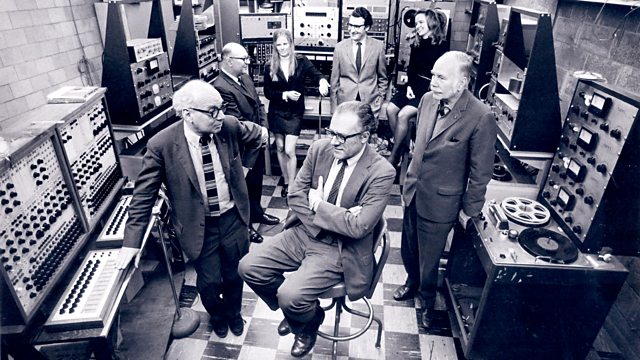Milton Babbitt: Changing the way we think about music
Daniele Gatti on life as the new Chief Conductor of the Royal Concertgebouw Orchestra, plus Sara Mohr-Pietsch examines the life and work of avant-garde American composer Milton Babbitt and 19th-Century conductor Hans Richter.
Last on
More episodes
Chapters
-
Daniele Gatti: opening hearts and minds
Duration: 10:35
Hans Richter: the world’s first career conductor
Duration: 14:13
Milton Babbitt: Changing the way we think about music
Duration: 16:23
Daniele Gatti: opening hearts and minds
![Daniele Gatti: opening hearts and minds]()
Italian conductor Daniele Gatti was appointed as the new chief conductor of the Royal Concertgebouw Orchestra in October 2014, and took up his post in September this year.
Maestro Gatti first conducted the orchestra in 2004 and won the backing of both the orchestra’s musicians as well as management. He talks to Sara about his relationship with the RCO and what it’s like to have such overwhelming backing from them.
And he describes the process of interacting with the orchestra’s legacy (in the shape of past conductors), his intention to expand their repertoire, in particular to embrace more of the greats of the French tradition, as well as his openness to new ideas and music.
More information:
Hans Richter: the world’s first career conductor
![Hans Richter: the world’s first career conductor]()
5th December 2016 marked 100 years since the death of Hans Richter. At the time of his death he was perhaps the most famous conductor in the world, and had achieved many firsts: the first career conductor to gain international fame, the first to conduct a complete Ring Cycle, the first to conduct Edward Elgar’s ‘Enigma Variations’. Over a 44 year career he conducted 4,351 performances.
In this centenary year of his death, Sara talks to conductor and music historian Christopher Fifield, who has just brought out an expanded edition of his Richter biography. He talks of Richter’s influence as a conductor with immense power to hire and fire and as a champion of music by Wagner, Brahms, Bruckner and especially Elgar.
Sir Mark Elder, music director of the Hallé Orchestra, of which Richter was principal conductor until his retirement, describes Richter’s legacy in Manchester and his relationship with Elgar.
Conductor Rebecca Miller laments that the lack of recordings by Hans Richter mean that younger conductors aren’t as aware of him as they should be, but makes the case that certain things about conducting don’t change, and that using imagination and reading about Richter can teach as much about how to conduct as looking at videos or listening to recordings.
More information:
Milton Babbitt: Changing the way we think about music
![Milton Babbitt: Changing the way we think about music]()
The American composer Milton Babbitt (who died in 2011) achieved unwanted notoriety with a 1958 article in High Fidelity magazine that the editor entitled ‘Who Cares if you Listen?’, which led to charges of elitism and holding audiences in contempt. Decades later he felt it still unfairly defined him, saying the title reflected ‘little of the letter and nothing of the spirit of the article’. So who was Milton Babbitt?
Milton Babbitt (1916-1991) enjoyed a long and distinguished career, teaching at the music faculties of Princeton University and the Juilliard School in New York. Long interested in electronic music, he was hired by RCA as consultant composer at the Columbia-Princeton Electronic Music Center, where he produced his 1961 ‘Composition for Synthesizer’. He taught generations of composers, as varied as Frederic Rzewski, Stephen Sondheim and Stanley Jordan.
Sara talks to those who knew him, such as soprano and friend Bethany Beardslee, who recalls a recording session of his 1964 serial composition ‘Philomel’ followed by another of his loves: Chinese food. Los Angeles based composer Laura Karpman, who studied with Babbitt at the Juilliard School, talks about the way he changed the way she and others thought about music, and how ahead of their time his vocal works were: ‘he played with language, jazz, scat…real vocal joy’.
Babbitt: a life
![Babbitt: a life]()
Dr. Newton Armstrong, composer and teacher, sees Babbitt’s music as being very multifaceted, finding new ways to navigate within limited and complex spaces. It doesn’t stand still, Newton says, and represents the first real break with serialism, citing the 1948 ‘Composition for 12 instruments’: ‘at the start it sounds almost like something Webern could have composed’ yet as the ‘piece evolves it is much more sustained and concerned with ensemble interaction’.
Mark Swed, music critic of the LA Times, reveals another side to Babbitt: ‘a great raconteur, baseball fan, connoisseur of beer; aficionado of the American songbook’, someone who ‘wanted to connect with people’ and who future generations of composers and musicians will decide to come back to.
More information:
Credit
Role Contributor Presenter Sara Mohr-Pietsch Broadcasts
- Sat 17 Dec 2016 12:15Â鶹ԼÅÄ Radio 3
- Mon 19 Dec 2016 22:00Â鶹ԼÅÄ Radio 3
Featured in...
![]()
Arts
Creativity, performance, debate
Knock on wood – six stunning wooden concert halls around the world
Steel and concrete can't beat good old wood to produce the best sounds for music.
The evolution of video game music
Tom Service traces the rise of an exciting new genre, from bleeps to responsive scores.
Why music can literally make us lose track of time
Try our psychoacoustic experiment to see how tempo can affect your timekeeping abilities.
Podcast
-
![]()
Music Matters
The stories that matter, the people that matter, the music that matters







